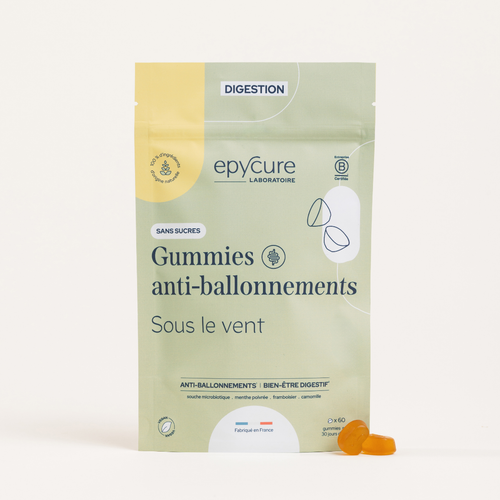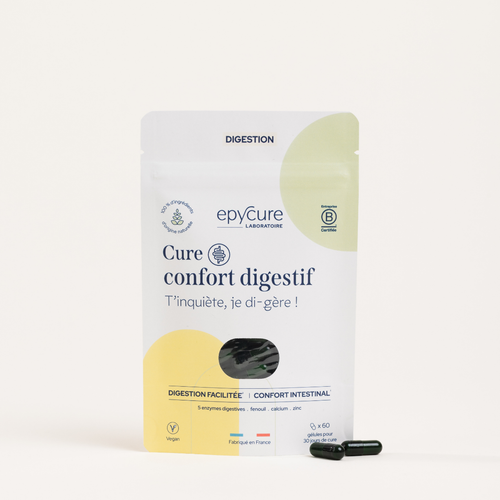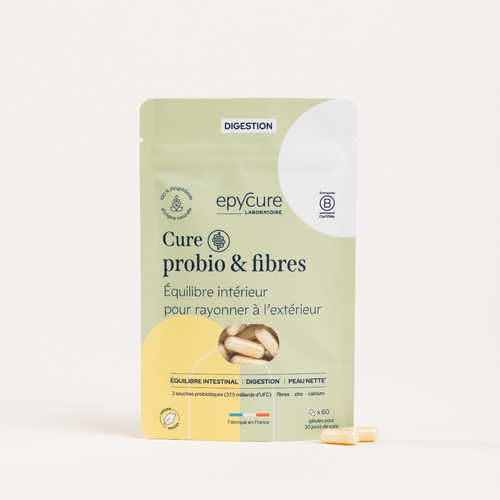The accumulation of gas in the intestine causes the stomach to swell, which is called meteorism or bloating. If these gases cannot be eliminated, they accumulate and cause abdominal pain. They can become very uncomfortable and inconvenient in daily life . It is also one of the most common functional digestive symptoms today. In fact, in France, half of the population is affected by abdominal bloating . But how can we explain these digestive discomforts and what solutions can be put in place to relieve them?
WHAT TO REMEMBER- Bloating can be caused by diet ( food intolerance, consumption of fermentable foods), intestinal health (irritable bowel syndrome, microbiota imbalance, constipation), hormonal fluctuations (especially in women) or lifestyle (stress, anxiety).
- Beyond the fact that a balanced diet is more than necessary to optimize your digestive well-being, it is also important to test the different categories of suspect foods to identify those that make your stomach bloat and thus avoid them (gluten, FODMAPs, etc.).
- Since the intestinal microbiota is the key to our digestive health, you must learn to pamper it on a daily basis by enriching it in particular with probiotics , these “friendly” bacteria that populate our intestines.
- Dietary supplement treatments , herbal teas, self-massage of the stomach, gastric bandages and sports activity can also be of great help on a daily basis to reduce your digestive discomfort.
Causes of bloating and swollen stomach
Bloating can be characterized by a feeling of distension and/or abdominal pain , as well as rumbling in the intestines. In addition, most people affected experience a visible increase in waist size . To help you see things more clearly, here is an overview of the different possible causes of bloating .
It refers to swallowing an excessive amount of air during the day. Note that we naturally swallow small amounts of air every day, when drinking, eating, and speaking. But sometimes a larger amount of air is ingested, particularly due to certain habits that make the stomach work on an empty stomach : consuming carbonated drinks , chewing gum , drinking through a straw, eating too quickly, swallowing very frequently, especially in cases of stress. Aerophagia can also be caused by the consumption of tobacco, alcohol, coffee, or other stimulants that can be irritating to the intestines. Excess gas accumulates in the digestive tract and can cause intestinal bloating, burping, and gas.
The second most common cause of bloating is constipation . This is because the accumulation of stool in the large intestine causes intestinal bacteria to ferment and leads to increased gas and bloating. Constipation is defined as a decrease in the frequency of bowel movements. According to the WHO, constipation is characterized by having fewer than 3 bowel movements per week.
Bloating can also be due to a food intolerance. Indeed, if undigested, certain molecules stagnate in the intestines and cause fermentation, which causes gas and bloating. What we now call food intolerance is actually a series of discomforts felt after consuming a specific food. The symptoms are caused by the difficult digestion of this food, and not by a reaction of the immune system as in the case of allergies. The most common food intolerances are intolerance to lactose , the sugar naturally present in milk, to gluten , which is found in certain cereals (wheat, barley, rye), to fructose , a sugar present in fruits and honey for example, and to sorbitol , a sugar alcohol present in jams, sweets or even foods “without added sugar”.
It is worth noting that celiac disease is a chronic, autoimmune disease triggered by the consumption of gluten . When gluten is ingested, the immune system attacks its own tissues, causing damage to the intestinal walls, making it unable to properly absorb vitamins, minerals, and other nutrients. In addition, this disease causes numerous digestive symptoms, such as diarrhea, bloating, and abdominal pain.
Eliminating or avoiding foods containing the substance responsible for the intolerance is the best way to avoid digestive problems . The support of a healthcare professional (doctor, allergist, nutritionist) is essential in following an exclusive diet because an unsuitable diet could cause deficiencies.
Irritable bowel syndrome (IBS), also known as irritable bowel syndrome (IBS), is a disorder of intestinal function. Although benign, this disease is responsible for significant digestive discomfort and degrades the quality of life of those affected . Indeed, it is a chronic pathology that combines abdominal pain (spasms, cramps), bloating , gas and transit disorders (constipation, diarrhea). Its origin is poorly understood, and it is too often neglected. However, it is much more widespread than we think, affecting approximately 5 to 10% of the population . This disorder is often diagnosed between the ages of 30 and 40 and affects many more women than men, or approximately three women for every man. To learn more, we invite you to consult our article on how to relieve irritable bowel syndrome .
The intestine is not just a simple digestive tract. It is an ecosystem that houses an entire microbiotic world called intestinal flora or intestinal microbiota , a set of bacteria, viruses and fungi essential to our health. Its health depends solely on the balance between friendly bacteria and bad bacteria . When these bad bacteria are in excess, they cause an imbalance in the microbiota called dysbiosis . And when they come into contact with certain foods, they cause gas and then promote digestive disorders such as bloating. They could even explain the development of certain inflammatory or autoimmune diseases.
The intestine has a large network of several million nerve cells that allow it to be connected to the brain. This is why it is considered to be our second brain. Reflecting our anxieties, the digestive system easily becomes disrupted and manifests itself when we are stressed by causing digestive discomfort. Indeed, in addition to disrupting the intestinal microbiota , stress leads to the mobilization of energy towards all the organs that will allow us to cope with the problem (brain, muscles, heart) and digestion then becomes secondary and is slowed down. This stress can thus cause cramps, spasms, bloating or even heartburn.
Hormonal fluctuations in women have a significant influence on the functioning of the intestines and the balance of the microbiota and are very often the cause of digestive problems such as bloating. Indeed, before the arrival of menstruation , the progesterone level increases and reduces the tone of the muscles located around the intestine, leading to a slowing down of transit and therefore the formation of gas. The same is true during pregnancy . High progesterone levels relax the intestines, which slows down digestion and causes constipation, bloating and flatulence. In addition, the pressure exerted by the uterus on the intestine can cause flatulence. We offer the Essential Maternity Cure , rich in probiotics, chamomile, vitamins & minerals, which provides all the essential nutrients to the (future) mother while taking care of her digestion. Finally, at menopause , the drop in estrogen and progesterone levels leads to its share of digestive discomfort. It slows down bowel movements and thus causes constipation and bloating. In addition, during menopause, there is often a decrease in muscle tone and intestinal lubrication, which contributes to these discomforts.
Certain foods are known to promote bloating. When they are broken down during digestion, they lead to the overproduction of intestinal gas and thus cause the stomach to swell. If you are regularly bloated, try to reduce the consumption of fermentable foods , those foods that ferment in the intestines. We can list cruciferous vegetables , the large family of cabbages rich in raffinose (cauliflower, Brussels sprouts, broccoli), raw vegetables rich in fiber that is difficult to digest and irritates the intestine (tomatoes, cucumbers, carrots), legumes (white beans, kidney beans, lentils, broad beans, peas) or foods rich in carbohydrates (sugars) or fats . Obviously, everyone's digestive system is different, you may digest cabbage perfectly but bread much less. In this case, test the different categories of suspect foods to identify those that make your stomach swell.
7 tips to avoid bloating and a swollen stomach
Here we've gathered some ideas for natural remedies and habits to help you relieve your bloating for good.
Observe the composition of your plates! In our diet, certain foods are known to cause bloating and others to help us relieve it. You can try to identify these foods by removing them or adding them one by one to your diet and see how your body reacts. Do not hesitate to consume fiber . They are very good for your health and particularly recommended in case of a swollen belly because they accelerate intestinal transit and thus limit the production of gas. But beware of insoluble fiber which, when consumed in excess, causes digestive problems. Opt for soluble fiber by eating whole grains (rye, buckwheat, barley, oats), certain vegetables (carrot, zucchini, asparagus, squash) or even certain fruits (orange, grapefruit, peach). You can also eat dried vegetables such as lentils or dried beans, very rich in fiber and protein. But it is absolutely essential to soak them in water the day before and rinse them before cooking them to avoid bloating after eating them. Also, consider reducing your consumption of raw vegetables, which are irritating to the intestine, and fats, which require much more digestion than other nutrients. In addition, banish carbonated drinks and chewing gum from your daily diet, which make the digestive system work "on empty" and cause digestive discomfort. Finally, it is important to take at least 20 minutes to eat . Chewing food well facilitates digestion and limits the risk of aerophagia.
FODMAPS (Fermentable Oligosaccharides Disacchararides Monosaccharides And Polyols) are a group of sugars found in many foods. They are naturally poorly digested and ferment upon contact with colon bacteria , causing overproduction of gas and digestive pain. Specifically, you need to reduce lactose (milk, yogurts), fructose (honey, wheat, barley, apples, pears), and sweeteners such as sorbitol (chewing gum, processed foods). The FODMAP diet aims to reduce the consumption of these sugars. It is implemented in three distinct phases:
- FODMAP restriction which consists of a strict elimination diet for 4 to 6 weeks,
- the gradual reintroduction of FODMAPs, which very often allows us to conclude whether the diet is effective or not,
- and finally, the personalization of the diet , since food sensitivities are obviously different from one individual to another. This personalization may require the intervention of a nutritionist or dietician, because the absence of a framework and advice can unfortunately lead to nutritional deficiencies.
Probiotics, known as "friendly bacteria," are the beneficial microorganisms in our body that form the intestinal flora and contribute in particular to the health of our digestive system . It is possible to enrich our microbiota by providing them externally. The foods richest in them are fermented milks, yogurts, sourdough breads, kefir, soy products, cheeses, sauerkraut and pickled vegetables. They are also available in the form of food supplements . At Epycure, we offer Anti-Bloating Gummies , apple-pear flavored chewable gums that help reduce bloating immediately. This 100% natural cure is composed of peppermint, chamomile, raspberry leaves as well as a strain of tyndallized probiotics ( Bifidobacterium breve DSM 16604 ) with clinically proven anti-inflammatory and pain-relieving action . We also offer the Probio & Fiber Cure , a complex of probiotics , prebiotics and minerals which helps reduce bloating, digestive cramps and transit problems . Our 4 patented probiotic strains have been rigorously selected for their complementary effectiveness on the intestinal microbiota: Bifidobacterium lactis LMG-21384, Bifidobacterium breve DSM16604, Lactobacillus plantarum LMG P-21020 and Lactobacillus rhamnosus DSM16605.
Bloating is often linked to excessive fermentation in the intestines. Performing a self-massage of the stomach is very effective in soothing these digestive discomforts. It stimulates colon motility and helps with the progression of painful gas and stools . To perform your massage, place your palms on your stomach, on either side of the navel, horizontally, and inhale. As you exhale, gently press your stomach as if you were trying to join your two hands. Note that this exercise should not be done immediately after eating, but rather on an empty stomach in the morning or evening.
Some carminative plants reduce flatulence by absorbing gas accumulated in the intestines and thus eliminate abdominal bloating. This is the case of fennel found in the Digestive Comfort Cure , cumin, ginger, coriander, thyme, anise or even peppermint and chamomile both present in the Anti-Bloating Gummies . One of the most effective grandmother's remedies is to use these plants in the form of an infusion. You can combine several plants such as thyme (anti-bloating), peppermint (against digestive disorders) and lemon balm (antispasmodic) to make a complete remedy. Fill your cup with very hot water and a pinch of each of these plants. Drink it after each meal to help your body digest.
Regular but moderate physical activity is a good way to relieve bloating . Indeed, exercise promotes contraction of the muscles of the digestive tract and helps reduce the transit time of food. It thus promotes the rapid expulsion of gas and limits the risk of constipation. So regularly practice physical activity adapted to your lifestyle and relatively gentle: cycling, swimming, yoga, etc.
The purpose of the gastric bandage is to neutralize the acidity in the stomach and create a barrier between the intestinal mucosa and the contents of the food bolus. To reduce bloating, you can use activated charcoal . It is a black powder obtained by calcining wood, coconut shells or olive pits. This carbonization aims to increase the porosity of the powder, these pores having the capacity to contain air. Activated charcoal can therefore eliminate gases due to fermentation in order to relieve bloating. You can do a course of treatment over 2 or 3 weeks by taking 2 tablespoons in a large glass of water per meal. You can also consume it in capsule form. It is advisable to take medications at least 2 hours apart from activated charcoal to avoid any interaction and not to limit its absorption.
Our selection to take care of your digestion
At Epycure, we offer three dietary supplements with very different formulas to help you regain a smooth digestion.
- If your digestive problems are numerous (digestive cramps, constipation, bloating) and chronic , probiotics can serve as a basic treatment to restore the balance of the intestinal flora and reduce your discomfort. Indeed, they act on the bacterial composition of the intestine and help fight against dysbiosis. In this context, you can follow the Probio & Fiber Cure for 3 months. Composed of 4 patented and clinically studied probiotic strains, it is a good boost to restore the balance of the microbiota.
- Whether chronic or occasional , if your discomfort depends mainly on the quality of your digestion , the Digestive Comfort Treatment will become your ally. Thanks to the combination of 5 digestive enzymes (alpha-amylase, lipase, protease, lactase and cellulase), fennel, calcium, zinc and vitamins, this treatment optimizes digestion , making it lighter, and gently stimulates transit , thus limiting the accumulation of gas in the intestines.
- Finally, if you often face problems with bloating , you can opt for our sugar-free anti-bloating gummies which combine the benefits of a microbiotic strain Bifidobacterium breve DSM 16604 and those of herbal medicine with chamomile, peppermint and raspberry leaves. They help reduce intestinal gas and therefore limit the feeling of a bloated stomach, to regain digestive well-being after large meals in particular .
If you regularly feel bloated and your stomach pain is intense, your bloating may have a medical cause. These symptoms should not be taken lightly if they are experienced chronically. In this case, it is strongly recommended to consult a doctor because these swellings sometimes mask a medical condition requiring specific treatment.







